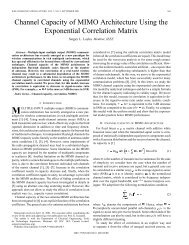A Wordnet from the Ground Up
A Wordnet from the Ground Up - School of Information Technology ...
A Wordnet from the Ground Up - School of Information Technology ...
You also want an ePaper? Increase the reach of your titles
YUMPU automatically turns print PDFs into web optimized ePapers that Google loves.
5.4. What Next? 181The derivational relations are an important part of <strong>the</strong> whole network. Instancesof derivational relations are often <strong>the</strong> only way of describing <strong>the</strong> meaning of adjectivalLUs. For future applications of plWordNet it is necessary to develop a more finegrainedsemantic description of derivationally motivated links.Much effort went into research on <strong>the</strong> various methods of automatic extraction oflexico-semantic relations and on <strong>the</strong> construction of <strong>the</strong> WNW system. A wordnetof a similar size, perhaps larger, might be constructed at <strong>the</strong> same cost without <strong>the</strong>support of automatic tools. The technology which we created, however, is ready to use;it opens interesting possibilities for fur<strong>the</strong>r improvements and extensions. The latestversion of WNW (Section 4.5.4) was used consistently for several months. That effortbrought about a significant increase in <strong>the</strong> number of lemmas, LUs and instances oflexico-semantic relations. WNW also helps find inconsistencies and missing elementsin <strong>the</strong> plWordNet structure.A final point: much of <strong>the</strong> previous work on wordnet development has focussed onEnglish, a language which typologically differs significantly <strong>from</strong> Polish. No researchsimilar to our appears to have been published for o<strong>the</strong>r Slavic language. The lack ofapplicable comparable experience added to <strong>the</strong> workload.5.4 What Next?It has been not so much <strong>the</strong> project deadline as <strong>the</strong> depletion of funds that has promptedus to announce <strong>the</strong> completion of plWordNet, version 1.0. Our plans go much fur<strong>the</strong>r,naturally. We perceive <strong>the</strong> construction of plWordNet as a continuous process. Its endcannot be easily predicted, given <strong>the</strong> amount of work – not to mention <strong>the</strong> fact thata complete wordnet is a moving target.We will gradually and systematically add new LUs to plWordNet using <strong>the</strong> WordNetWeaver system. The system of relations among verbs will be fur<strong>the</strong>r developed. It isan open question whe<strong>the</strong>r to expand it inside plWordNet, for example by describingsubcategorisation frames and semantic selectional preferences in association with nounsin plWordNet, or to combine it with some o<strong>the</strong>r resource oriented toward <strong>the</strong> descriptionof verbs.We must begin to align plWordNet with o<strong>the</strong>r wordnets – PWN, GermaNet orBalkaNet are likely counterparts. We will also work toward making plWordNet a part of<strong>the</strong> Global WordNet Grid (Fellbaum and Vossen, 2007). Sometimes flying, sometimeswalking, but always steadily moving towards a large wordnet for Polish: this is ourplan. The pace, as expected, depends on funding.O<strong>the</strong>r than <strong>the</strong> obvious goal of “growing” plWordNet, we see two directions offuture work:



